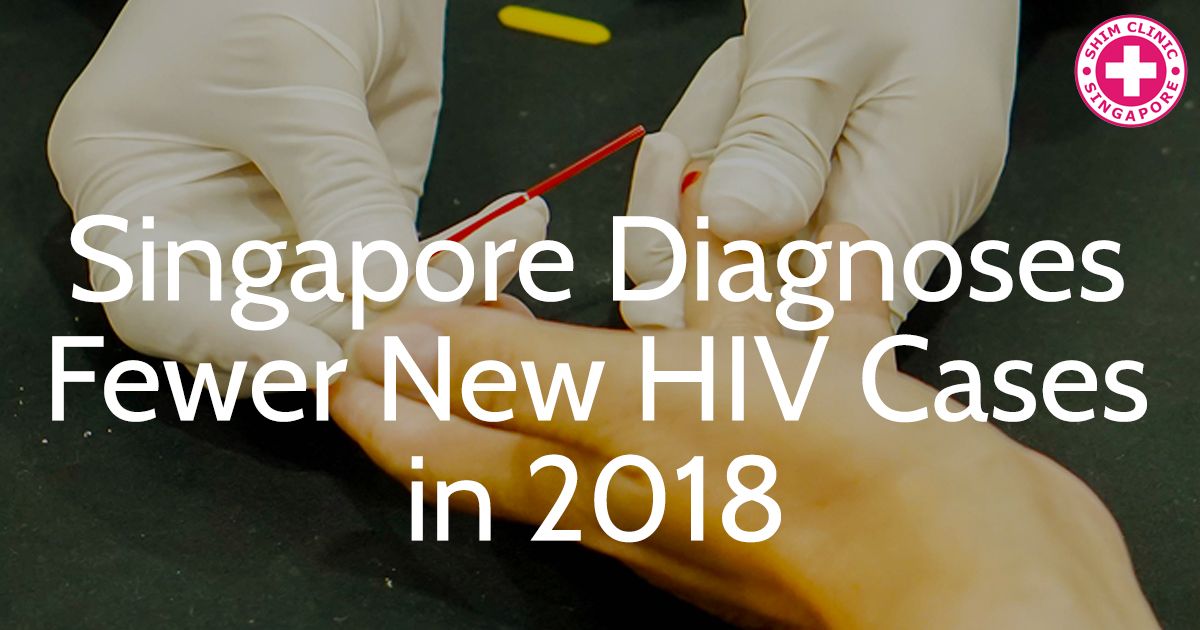How common is HIV in Singapore? The situation changes each year but a positive trend has fortunately been noticed in 2018.
The Singapore Ministry of Health reports on the incidence of HIV infections every single year. In 2018, the number of new cases has gone down in comparison to figures for previous years.
2018 Marks a Reduction in New HIV Cases
From January to October 2018, there were 265 new HIV diagnoses in Singapore. The decrease is significant from 361 cases for the same period of 2017.
All of the new cases resulted from unprotected sexual intercourse. Heterosexual transmission contributed to 45 per cent of the cases, 43 per cent resulted from homosexual transmission and 12 per cent – from bisexual transmission.
Of all people diagnosed with HIV in 2018, 90 per cent were men. Most of the new cases (46 per cent) occurred in the 40 to 59 age group. Forty per cent of the new cases were diagnosed among those aged 20 to 39.
The one negative aspect of the statistic is the stage of diagnosis. The number of people who get diagnosed at a late stage of the HIV infection has grown from 42 per cent in 2017 to 53 per cent in 2018. Only 17 per cent of the new cases were identified through voluntary HIV screening. The vast majority, 57 per cent of the diagnoses, occurred during routine medical screening and service provision.
Regular Screening Can Save Lives
The Singapore Ministry of Health urges high risk individuals to get screened for HIV regularly. When diagnosed early, the infection can be managed much more effectively.
An early diagnosis will significantly postpone the onset of acquired immune deficiency syndrome (AIDS) for many years. Thus, people infected with HIV can continue leading a healthy and fulfilling life for years to come.
Those considered at a higher risk of an HIV infection include homosexual and bisexual men, sexual workers, those who engage in risky sexual behaviours and those who aren’t in a mutually-monogamous relationship. For such individuals, HIV testing is recommended annually or even two times per year.
Preventative Practices Are Also Vital
As per the Ministry of Health announcement, there are strategies that can be incorporated in one’s lifestyle to massively reduce the risk of HIV infections and the spread of sexually transmitted diseases (STDs).
Remaining faithful to one’s spouse or partner is presented as the number one possibility for the prevention of HIV infections. The same applies to avoiding casual sex or encounters with sex workers. Those who have multiple partners or engage in risky behaviours need to use condoms to reduce the risk of contracting HIV, as well as other sexually transmitted infections.
The ministry is still working on regular campaigns and programmes that will raise HIV awareness in Singapore and prompt more people to do voluntary testing on a regular basis. Educational and outreach programmes already exist to reach high risk individuals. Based on the 2018 numbers, these awareness campaigns are probably effective but they haven’t increased the percentage of people who do regular screening on their own.
For those who are living with a HIV-positive partner or spouse , or those who frequently engage in highly-risky sexual behaviours, “treatment as prevention” is a good strategy to consider. This strategy exists in the form of HIV PrEP – a treatment that greatly reduces the risk of HIV infection before exposure, like condom break, slip, or no condom. It involves the regular daily consumption of two HIV medications in a single pill.
If you do find yourself in a situation where you highly expect you have been exposed to HIV within the last 72 hours, go quickly to a STD clinic like Shim Clinic to be treated with HIV PEP – this treatment greatly reduces your chance of being infected.
If you find yourself in a high risk situation, you will need to seek a testing possibility.
Not knowing is far from beneficial to you. While getting a positive HIV status can be stressful, you will get opportunities for modern and effective management of the viral infection – modern HIV antiretroviral medication has been proven to live healthy lives with close to normal life expectancies. These medications help to push the viral load down to non-detectable levels – which effectively means non-transmittable. There are specialised STD clinics in Singapore that offer screening, guidance and additional referrals for the identification of the best HIV treatment options in the case of a positive diagnosis.
Shim Clinic is a STD clinic in Singapore that enables walk-in HIV testing, as well as screening for various other STDs. The conducted tests will produce accurate results that you can base further healthcare steps upon.


Pingback: The World Already Has a Second Patient Cured from HIV Infection
Pingback: HIV Status of More Than 14,000 People in Singapore Leaked Online
Pingback: The World Sees a Massive Reduction in HIV/AIDS Deaths Since 2010